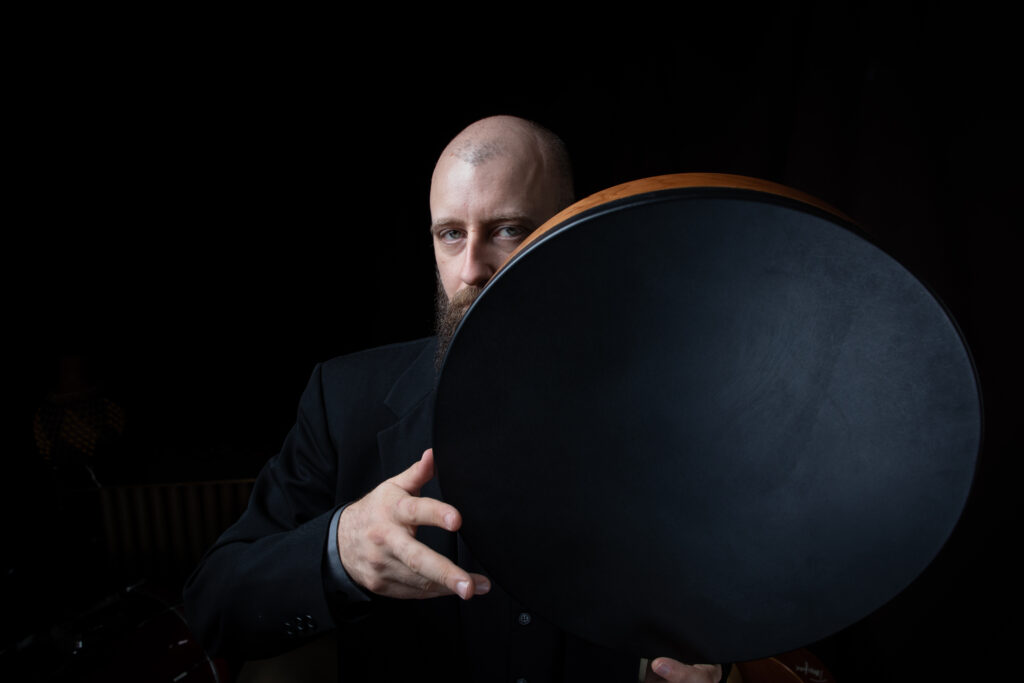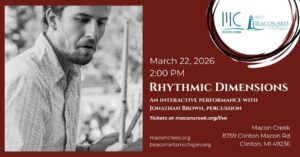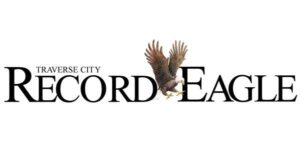T.J. Troy believes artistic freedom and integrity comes first.
A percussionist, composer, and producer, T.J. became a Grammy-winning performer the same way all the greats did: through pure love of music itself. All the trimmings—all the glory of stages and the grind of daily practice—to him is meant in service of the art form, full stop.
In June of 2021, as musicians around the world were starting to emerge from the challenging COVID-19 era, T.J. was forced to count the cash value of this ideal. What is a principled response to vaccine mandates in the arts world, where creators most often operate as independent entities? Read T.J.’s take on that below, alongside other insights about how international travel shaped his political worldview, why “you’re only as good as your last gig,” and whether music has lost its cultural resonance.
I highly encourage you to check out T.J.’s upcoming album with his Run Downhill ensemble (“a mix of Pink Floyd meets Johnny Cash meets Tortoise”). The new single, “Rock and Roll Ain’t a Rhythm,” is the first of a series of songs each to be released alongside a motion comic music video—so subscribe to Run Downhill on YouTube to experience these works for yourself! You can also follow T.J. on Spotify and Instagram.
Background
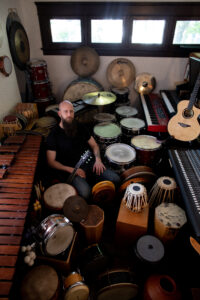 Alma Cook: Thanks for joining us, T.J.! Take us back to your beginnings. You’re a Grammy-winning performer and an accomplished percussionist, composer, and producer. How did you get to where you are today?
Alma Cook: Thanks for joining us, T.J.! Take us back to your beginnings. You’re a Grammy-winning performer and an accomplished percussionist, composer, and producer. How did you get to where you are today?
T.J. Troy: Thank you so much for having me today.
I’ve been playing the drums since age 4; I come from a big family and everyone played an instrument. My grandfather, my older brothers, and one cousin all played the drums, and when I could manage, I would sneak into my older brother’s room and get behind the kit—eventually, I taught myself how to play. I was so small my feet couldn’t reach the bass drum or hi-hat pedals; when I was finally tall enough, I had to relearn everything with my feet. I was a focused and determined listener, observing what my siblings learned in lessons or from one another regarding musicianship, and I remembered all of it.
I grew up in a small town (one high school) that fortunately had a great music program in middle school and high school that provided good opportunity for me to practice and grow. I started entering competitions, then started winning those competitions, and then was accepted to the University of Michigan School of Music in their percussion department, which was probably the best school for percussion at that time. In autumn 1999 I relocated to California to pursue a master’s degree at the California Institute of the Arts, and since completing that in 2001, I’ve lived in Los Angeles and pursued my career as a professional musician.
In the 20+ years since, I’ve made my musical practices the focus of my life’s pursuit. My goal has always been to be a professional player, and this remains the thoroughfare through the various activities that comprise my livelihood. I continue to study, taking private lessons on certain instruments with master players and teachers. I play hundreds of gigs and rehearsal services throughout the year, some with various ensembles and organizations that contract me as well as groups I’ve played regularly with for many years.
AC: You’ve got a niche—how do you describe your work to people who have never heard it?
TT: As a player, I’m the prototypical hired gun; when you have a need for a drummer/percussionist on short notice, or for difficult music, I’m the person you call for a variety of different instruments styles, from drumset to orchestral percussion, to Arabic, Persian, and North Indian Classical styles and beyond.
My current performance practices center around a couple of key ensembles, namely a duo project with Iranian tar virtuoso Sahba Motellebi called The Forge, the Los Angeles Arabs Orchestra, and my own ensemble Run Downhill. I’m also working with a number of producers, songwriters, and band leaders as a freelance percussionist, the majority of which feature my hybridization of world percussion/hand drumming with drumset playing.
My work varies quite a bit, often seasonally, and projects come and go. One year I may be working a great deal with one ensemble, and the next year the focus shifts to something entirely different; such has been the arc of my career.
My own band, Run Downhill, I have always called a mix of Pink Floyd meets Johnny Cash meets Tortoise. Our first few albums were more folk and Americana focused, but the upcoming album is a straight up indie rock album. We also create comics to accompany the songs, and beginning with the third album, every song has a comic component. We edit together the imagery from the comics into a motion comic video and perform live next to it, creating a sort of silent movie performance aesthetic.
Musicians around the world share this value: if you can play an instrument, we are connected and we value one another. It’s an unspoken but real and genuine expression of artistic values that transcends every culture, nation, style, and tongue. It’s amazing how quickly one can make friends when musicians sit down together and play their instruments for one another.
T.J. Troy Tweet
AC: Ok, so now give us some context for your politics. What and who have shaped your worldview? Did the arts play any role in that, or do you see your artistry and your politics as being on totally separate tracks?
TT: My life as a musician has absolutely defined my worldview, and international travel has been the singular greatest driver of that. My first international experiences were with an orchestra called MESTO, the Multi-Ethnic Star Orchestra. We played Arabic Classical Music under the direction of Maestro Nabil Azzam, and he was a hard-working, driven man—a very accomplished violinist and conductor/arranger, and his dream was to create an orchestra in the United States to play this music and take it to the Middle East. 2007 was the first of five tours of the Middle East, this one centered in Jordan; we had performances in Amman as well as the small town of Jerash, once a Roman outpost, where we performed in a 2000-year old Roman amphitheater…amazing. I’ve performed in Egypt, Oman, Jordan, United Arab Emirates, Russia, India, China, Mexico, and having the opportunity to travel, observe, and make music in different countries gives incredible perspective on life back in the United States. I came away with a great respect for my home and the great luxuries we enjoy and the freedom we have to pursue life with meaning.
Within these situations are opportunities to commune with other musicians, and you learn quickly that music is indeed an international language, but so are the intrinsic musical values of respect and admiration for one another. Musicians around the world share this value: if you can play an instrument, we are connected and we value one another. It’s an unspoken but real and genuine expression of artistic values that transcends every culture, nation, style, and tongue. It’s amazing how quickly one can make friends when musicians sit down together and play their instruments for one another.
Given all that, it’s safe for me to say that my artistry and politics are imbued with similar values. In practicum, however, it’s not always the case. I fall in the category of liberal-minded musician witnessing the hijacking of artistic and cultural institutions, watching the ground shift beneath me—while my values didn’t change, the political landscape, and political definitions (especially reinforced via media promulgation) had changed, and what once was a center-left position was now much further right than I had ever conceived myself as being…but here we are. I continue to orient my worldview around my artistic values, and in situations where those values suddenly (and inexplicably) come into conflict with current cultural and artistic institutions, I defend the artistic values, as I feel it’s my responsibility to do so.
Deep Dive
AC: You recently left an arts nonprofit that you were a part of for nearly two decades. Talk to me about how and why this happened.
TT: Recently, I left an organization that I had been a part of for nearly 17 years. I joined the group in 2004 as a player, and over many years I grew closer to the people in the group. In 2018, the original founder of the group asked me if I could take the reins of the organization and lead us to higher levels of professional success. I agreed.
My first steps were to incorporate as a 501(c)(3) non-profit organization, which I then served as president for over 3 years, as well as serving the duties of de facto executive director. I donated my performance fees back to the organization, as I felt it inappropriate to be seen as enriching myself through this group that I also served in a leadership role (although, in the pandemic, they did offer me a small administrative stipend). All things were running smoothly until COVID, and like so many performing arts ensembles, all our programming was canceled for 2020, and we worked tooth and nail to stage a virtual concert in June 2021, to great success.
I had worked to secure a contract to take the entire ensemble to South Korea to participate in an international festival of music, bringing enormous value to our group and committing to the single largest event in our group’s history. Our board of directors was elated to receive the final contract and begin the process of approving it. It was at this meeting that one board member suggested we mandate vaccines as a precondition for our group’s members to enter into a rehearsal or performance space. Keep in mind: our group’s members were independent contractors, not employees, and though we were becoming more successful, our group was so small that I felt it an organizational overstep to enter into the arena of public health policy and begin dictating behaviors on behalf of our group’s members. I objected immediately, for the aforementioned reasons, but my board decided (in knee-jerk fashion) to push forward with a resolution to mandate vaccines as a precondition for participation in our group. I was stunned to see that mine was the only dissenting voice. I resigned the next day.
AC: How do you feel about resigning over this vaccine mandate, looking back on it now with a little breathing room?
TT: I do not believe it was my position to demand that any individual agree to a medical procedure based on an individual or organizational decree. I felt then, and still maintain, that my duty was to defend the artists in my group and their individual autonomy to make their own informed decision. I acknowledge that various venues and presenting organizations may require various benchmarks be met, whether that be a vaccine passport or proof of negative test, and that in order to be considered as a performing ensemble in those presented series or venues, that it may be required for my organization to abide by those mandates. However, it is not my role to demand my ensemble members meet a requirement dictated by my organization; rather, it is my responsibility to defend the right for each member of my ensemble to make an informed decision for themselves and to stand in solidarity with those decisions.
For many years I have lived by a simple axiom: Integrity sells for very cheap, but it is the most expensive thing in the world to buy back. I stand by my previous decision in this situation and wish the ensemble the very best of luck, and I’ve committed to moving on in my own career without this ensemble.
For many years I have lived by a simple axiom: Integrity sells for very cheap, but it is the most expensive thing in the world to buy back.
T.J. Troy Tweet
AC: Would that we all made principled stands for what we believe in—and could do so respectfully, as it sounds like you did here. Do you feel like artists have any unique responsibility to speak out about ideas or issues, since the world is watching us more carefully than people in non-entertainment jobs?
Quick Takes
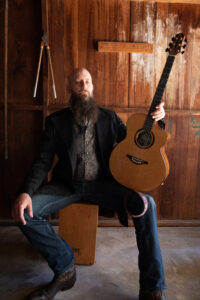 AC: Ok, now for some quick takes! Have you noticed political uniformity among musicians and creative types? If yes, why do you think this is?
AC: Ok, now for some quick takes! Have you noticed political uniformity among musicians and creative types? If yes, why do you think this is?
TT: Yes. There is a collective fear amongst artists, musicians especially, that going against the grain politically/culturally will result in cancellation, which is all too real. There’s a collective sense to “do the right thing,” which often translates into “do whatever anyone wants, when they say it.” The creative mind is often an agreeable mind (being high in creativity often correlates with being high in personality trait openness), and sometimes that means agreeing with something for the sake of group cohesion rather than an actual understanding of the issue one is agreeing with. I think if more musicians stopped and thought about it, they would not always default to the party line.
AC: How do in-person performances compare to recorded ones? Do you prefer one medium to the other?
TT: In-person is direct, immediate, and experiential; recorded music is archival. This is the only principle distinction. That said, listening to a recording can be dramatically experiential, and it used to be that every album you bought would come with some interesting or amazing experience when listening for the first time. But as I previously stated, most music consumption is transitory, so there are fewer associations being built between hearing a song or piece of music and remembering the situation that listening took place in.
If I had my druthers, I would spend all day, every day, making recordings. I love the process; it’s more akin to sculpture than anything else—starting with a block of raw material and chiseling away until the image begins to take shape, and then it’s a matter of refining that image until it naturally culminates. Don’t get me wrong, I love playing live concerts and am always compelled to try to play more; but recording music is as fun as it is meaningful. As a listener, I prefer live concert experiences as they tend to be more holistically engaging, tantalizing more of my senses and memory. But I have powerful associations with certain albums that are equally meaningful—it all depends on the music.
AC: If I wanted to become the next T.J. Troy, how would I do it? What’s your best advice for musicians navigating your corner of the music scene?
TT: I wouldn’t advise trying to become me. But I would certainly encourage people to learn from my experiences and mistakes and focus energy on specific areas, rather than trying to do everything all at once. Specifically, reach a high level of musicianship and virtuosity on an instrument, and practice as much as you can to maintain that level and reach beyond it. You’re only as good as your last gig, and people are always listening to see if you’re slipping back in your skills, so keep them sharp. Go to music daily: practice, write, record, rehearse with your band(s), schedule gigs, and repeat. Always build toward a higher standard of performance practice.
You must set some goals and become proficient at achieving them, bottom line. If you want audiences to hear your music, you’ve got to have good records to share. Find players that are better than you and set up jam sessions (remember music is social!), take lessons and practice the material your teacher shows you. Go see as much live music as you can, and remove the distractions/barriers keeping you from those experiences.
You must visit the muse everyday, or it will stop coming to you. And, even when you do pick up your instrument, there will be uninspired days. Learn to deal with it, and roll on to the next day. That one song not coming out the way you hoped it would? Write another one. Keep writing, even the bad songs…you’ll be a better writer for it.
Can’t afford to make a good recording? Learn to make your own recording…
Have a vision but don’t know how to put it together? Find someone who understands how things get put together and learn from them…
Above all, there is but one direction: forward.
What's Next?
AC: Tell me about your upcoming album and accompanying videos! How did this project come about? Care to share any of your favorite tracks from it?
TT: It’s my first album since 2017 with Run Downhill, and I’m quite excited, as it’s the first album where I wrote, performed, recorded, and mixed the entire record myself, with the help of some great guest musicians and bandmates.
In 2019, I joined a writer’s collective called Song A Day For A Month, and it’s literally as it sounds; each day for the months of January and July, you write a fresh song and upload it to the site. It can be as simple as a chord progression strummed on a guitar or piano or as complex and filled out as you can make it, completely user-driven. The songs from the new album, entitled nineteen/twenty, are all drawn from my output from the months of July 2019, April and July 2020 (we added April 2020 due to COVID, to keep our collective spirits up). I chose these songs, as these were the ones that I did not edit, rewrite, or otherwise rearrange from the day I originally wrote them. I did re-record all the songs with higher production quality etc., but I did not alter melodies or re-write lyrics, and no major edits were made from the original demo versions of the songs. As such, I call this my stream of consciousness album—very much a direct line of thought from my imagination, through my hand, to the recorded artifact, and it’s my favorite album of my songs to date.
The second single for the album, entitled “Something Will Come of This,” is one my favorite songs I’ve ever written. It came on July 18, 2019, and I remember distinctly finding the chords on the guitar first and immediately feeling the hair on my neck stand up…this was going to be a special song. A melody was slowly drafting itself, but lyrics were not coming, so I took a bathroom break. I sat with my phone (I rarely write lyrics on my phone, but sometimes it’s good to change it up), and as I was feeling frustrated that this was a great sounding tune but no lyric ideas were coming, I simply wrote “something will come of this…it has to,” and that became the first line for the song. I finished the lyrics minutes later. At this time, July 2019, there were reports of typhoid fever cases rising throughout Los Angeles, including near the neighborhood where I live. It was speculated that the rise in rat population throughout the city was bringing more infected rats from the mountains and wilderness areas down into the city, and given the rampant homeless encampments throughout the city (and the political failure in managing these areas and their populations), the bulk of these cases were centralized in those encampments. So, quite the juxtaposition that one of the most advanced cities in the world is suffering from increasing endemicity of a medieval disease—such is the landscape of modern California life.
AC: Where can we find the project once it’s out?
TT: I’m creating motion comic music videos for each song on the album, together with visual artist Claudio Ghirardo (add video editor to my list of credits for this project—one more hat to wear), and those are all being released on YouTube. The first single is out now, “Rock and Roll Ain’t a Rhythm,” and that video can be found on our YouTube channel, as well as on Spotify and all other streaming platforms.
The second single comes out June 15, and that’s “Something Will Come of This,” plus 3 B-sides not available on the full album. Each of those have motion comic videos too. Then the full album is released on July 18, videos all released the same day.
I’m hoping to get everyone to YouTube to view the videos and listen, mostly because I love the comic stories that Claudio and I made together, I think they really suit the music nicely. After that, I hope everyone goes to Spotify and streams there.
But if you really want to support the artist, I’m releasing a special 2-disc set that includes the full album nineteen/twenty, plus the “Something Will Come of This” maxi-single (with 3 B-sides), that you can buy directly from my website at www.rundownhillmusic.com and also from Bandcamp. Digital downloads are available for purchase from Bandcamp, as well as Apple Music, Amazon Music, and all other online digital stores.

